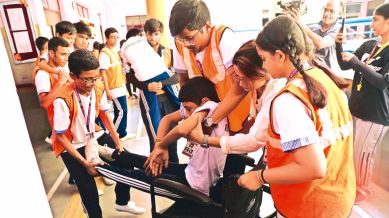Stay updated with the latest - Click here to follow us on Instagram
How to talk to kids about India-Pakistan tensions? Here’s what Delhi’s schools and parents say
Parents and school principals, left to pick up the emotional pieces, now urge for more sensitive communication and preparation to help children process what they saw and felt.

“There’s going to be a fight,” a Class 1 student at Sardar Patel Vidyalaya whispered to her father after an emergency mock drill at her school left her visibly shaken.
Across hundreds of Delhi schools, sirens, blackouts and lockdown routines on Wednesday played out as part of a government-mandated exercise in the wake of the April 22 Pahalgam attack — but for many young children, the drills sparked anxiety more than awareness.
monthly limit of free stories.
with an Express account.
Parents and school principals, left to pick up the emotional pieces, now urge for more sensitive communication and preparation to help children process what they saw and felt.
Karan Aggarwal, whose daughter studies in Class 1 at Sardar Patel Vidyalaya, Lodhi Estate, said his daughter returned home after the drill, visibly shaken.
“Fight hone wali hain (There is going to be a fight) was all she could understand… She had coaxed me to go to Kashmir for summer vacations. I insisted, ‘We cannot go… it is unsafe’. So, she realised something was wrong.”
Maintaining that confusion loomed heavily among parents in the lead-up to the mock drill, Aggarwal said “sensitising children to emergencies is critical”, especially keeping in mind their mental state.
After the mock drill, the school sent an email to all parents listing out useful techniques.
“The current environment has induced a state of vigilance, uncertainty and distress for all. While as adults, we are able to communicate, search for concrete information, and use our resources to calm ourselves, it is challenging for children to express feelings they have not felt before,” it stated.
“There is a sense of urgency being translated as worry to children,” it added.
The email also noted that sirens and blackouts, though necessary, left “young children with many unanswered questions”. Informing that the school authorities “sensed children’s anxiety and tried to address it through reassuring conversations”, it suggested that the parents should exercise caution.
The mother of a 7-year-old daughter studying at Sri Sri Ravi Shankar Vidya Mandir (SSRVM) in Noida also shared deep reservations. “Unfortunately, the drill had a noticeable negative impact on my daughter’s mental well-being, and as a parent, it is deeply concerning,” she said.
A senior official from the SSRVM administration told The Indian Express that at least three complaints have been received from parents about how their children had reacted to the mock drill. “We are providing counselling to those children. The students were briefed by the principal and also by their respective class teacher,” the official said, adding that they had not sent any prior notice to parents about the drill.
Salil Bhatia from South Delhi, whose two children study in Class 2 and Class 4 at Delhi Public School, East of Kailash, said “communication is the key”. He said that while no official intimation about the mock drill was sent to parents from the school, the responsibility of keeping one’s children up-to-date falls on the parents, which should be part of their “normal routine conversations”.
Early Wednesday, Bhatia had switched on the TV and showed his children scenes of the Indian Armed Forces striking 9 sites in Pakistan and Pakistan-occupied Kashmir, as they launched ‘Operation Sindoor’.
“I deliberately switched on the TV when my children were getting ready for school. I told them… ‘We (the Indian government) have to fight the terrorists. They are bad people’,” he said.
To Bhatia’s surprise, after the mock drill was held in the school, his children came up excitedly to him. “My younger son told me… his classmates were all chatting under the table while they took shelter during the drill. I had to hold back my laughter and explain: ‘It is a very serious scenario. You cannot talk like that during emergencies’.”
“If parents calmly explain to their children about the current developments, then they won’t be frightened. Children get afraid only when they are unprepared… It is the parents’ fault. We need to sensitise and inform our children,” he added.
Richa Sharma Agnihotri, Principal at Sanskriti School, Chanakyapuri, told The Indian Express: “We communicated with the parents before and after the mock drill. The parent representatives of each class and the PTA (Parent Teacher Association) members in the school were sent an email on conducting such a mock drill. After it was held… we issued a circular reinforcing the need for parents to communicate with their children at home, as well.”
Dr Bhavna Barmi, senior clinical psychologist at Fortis Escorts Heart Institute, said in emergency scenarios, especially drills involving potential threats, it is critical to remember that children up to Class 5 are still developing cognitively and emotionally.
“Their perception of danger is vastly different from that of older children or adults. Sudden exposure to mock drills — alarms, lockdowns, or simulations — without age-appropriate explanation can easily trigger anxiety, confusion, or fear responses in them,” she added.
Dr Barmi suggested pre-drill sensitisation in simple language, adult modelling and reassurance, post-drill check-ins, involvement of parents, use of familiar analogies and therapeutic play tools to deal with such situations.